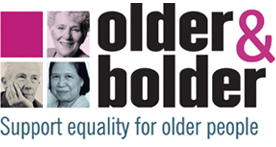Older & Bolder closed June 2013 This is an archived website
Older people are contributors, not just recipients of health care [051211]
Older & Bolder welcomes Minister Howlin’s commitment today to maintain ‘social solidarity in the face of difficult times,’ which the Minister has demonstrated with the continued support for the Medical Card and long-term care. Older & Bolder Director Patricia Conboy said, “I am disappointed that the Minister has singled out older people as ‘placing demands on essential health and personal social services…’
Ms Conboy continued, “Older & Bolder rejects images of older people as passive consumers of health care. We know that most older people take proactive steps to maximise good mental and physical health, and strive to stay socially engaged. Many older people also play an active role in supporting others’ well-being through caring for their spouses, relatives and friends. They are actually contributors as well as recipients of health care, as are people of all ages. This contribution needs to be recognised. It is not fair to single out older people in the context of access to services.”
The Taoiseach’s goal of making Ireland the best small county,‘in which to grow old with dignity and respect’, will require an appreciation of older people as health care contributors as well as recipients.
Notes to Editor:
People with impairments in activities of daily living (dressing, grooming etc) receive on average 118 hours of help per month. The most common primary helper for this group is the recipient’s spouse, representing a contribution by older adults to the care of older adults.
This data is from The Irish Longitudinal Study on Ageing (TILDA), a large-scale, nationally representative study of people aged 50 and over in Ireland. More than 8,000 people participated in the first wave of TILDA interviews and first results were published in 2010










